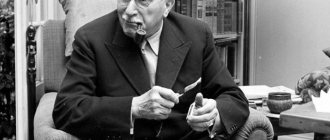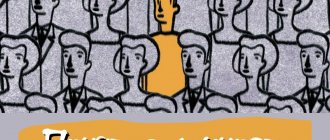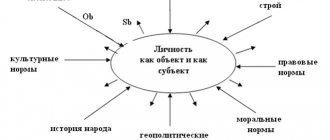Julian Rotter: Locus of Control Theory
Julian Bernard Rotter is an American psychologist who authored influential theories including social learning theory and locus of control theory. Biographical sketch
Julian Bernard Rotter was born on October 22, 1916, in New York, the third and youngest son in a family of Jewish emigrants. Until the Great Depression, the Rotter family belonged to a completely prosperous middle class; the father of the future theorist was engaged in the wholesale trade of office supplies. Then, however, they had to transfer all the hardships of unemployment and life to social benefits.
Depression awakened in Rotter an interest in the problem of social injustice that did not leave him throughout his life, and also taught him to pay attention to the importance of situational conditions influencing people's behavior.
The Rotter family lived in Brooklyn, and young Julian was a regular reader of the local library, literally devouring all the adventure books there. One day, while still a schoolboy, he accidentally walked up to the shelves where there were books on psychology and found Adler’s “Understanding Human Nature,” Freud’s “The Psychopathology of Everyday Life,” and Karl Menninger’s “Human Consciousness.” Adler and Freud made a particularly strong impression on him, and he soon returned for more books on psychology (Rotter, 1982, 1993).
However, during the depression of the 30s, the humanities did not seem reliable, and Rotter entered Brooklyn College, choosing chemistry as his main subject, and studied psychology, which he was already seriously interested in, only as an elective. Adler at this time taught at Long Island Medical College as a professor of medical psychology. Rotter began attending his lectures, attended several clinical demonstrations, and eventually became personally acquainted with Adler, who invited him to participate in meetings of the Society for Personality Psychology (Rotter, 1993).
In 1937, Rotter graduated from Brooklyn College, taking more courses in psychology than in chemistry, and to complete his education in psychology, he entered the University of Iowa, where he received a master's degree in 1938. Rotter completed his clinical psychology internship at Worcester State Hospital, Massachusetts, where he met his future wife, Clara Barnes. Rotter then attended Indiana University and received a doctorate in clinical psychology in 1941.
In 1941, Rotter married and accepted a position as a clinical psychologist at the State Hospital in Norwich, Connecticut, where his duties included teaching interns and assistants from the University of Connecticut and Wesleyan University. In 1942, Rotter was drafted into the Army and spent three years as a military psychologist.
After the war, Rotter returned to Norwich for a short time, but soon took a job at Ohio State University, to which he attracted several able graduates, among them Walter Mischel. At that time, Carl Rogers had just left Ohio, leaving the two most influential psychologists there, Rotter and George Kelly. However, Rotter was dissatisfied with the political situation created in Ohio under the influence of McCarthyism, and in 1963 he took a vacancy as director of the clinical psychology training program at the University of Connecticut. He continued to work in this position until his retirement at the age of 70. Since 1987, Rotter has retired, but continues to be active in teaching. Rotter and his wife Clara (who died in 1986) had two children - a daughter, Jean, and a son, Richard, who died in 1995.
Rotter's most significant works are “Social Learning and Clinical Psychology” (1954), “Clinical Psychology” (1964), “Applications of Social Learning Theory to Personality”, 1972) with J. E. Chance and E. J. Phares, Personality (1975) with E. J. Hochreich, " The Development and Application of Social Learning Theory: Selected Papers (1982), Rotter Incomplete Sentences Blank (Rotter, 1966), and Trust in Human Relationships Scale (Interpersonal Trust Scale, Rotter, 1967). Rotter has been active in professional organizations, serving as President of the Eastern Psychological Association and President of the Division of Social and Personality Psychology and the Division of Clinical Psychology of the American Psychological Association (APA). In addition, Rotter served on the APA Education and Training Council for two years. In 1988, he received the prestigious APA Distinguished Contributions to Science Award and in 1989, the Board of Directors of University Clinical Psychology Programs Award for Distinguished Contributions to Clinical Training.
Retired in 1987.
Died January 6, 2014.
Locus of control
Locus of control
is a concept in psychology that characterizes a person’s ability to attribute their successes or failures only to internal or only to external factors. Introduced by Julian Rotter in 1954.
The tendency to attribute performance results to external factors is called external locus of control (externality).
The tendency to attribute performance results to internal factors is called “internal locus of control” (internality). The internal factors here are the individual’s personality traits: one’s own efforts, one’s own positive and negative qualities, the presence or absence of the necessary knowledge, skills and abilities, etc.
“Locus of control” is also called “localization of control of volitional effort.”
For example, if a student received an unsatisfactory grade, then, having an external localization of control, he will blame it on external factors (for example, “guests came to my parents and distracted me from doing my homework,” “the assignment was poorly written on the board,” etc. .), and having an internal one - to internal ones (for example, “I did not have time to properly prepare for the subject”, “I was never able to find a solution to the problem”, “this subject is not interesting to me”, etc.).
The Rotter questionnaire is used to determine the locus of control. You can also learn about it from the Rosenzweig technique.
MED24INfO
From the point of view of Rotter's social-cognitive theory (Rotter, 1954), external events can have different influences on human behavior, and the nature of this influence will significantly depend on the way in which these events are perceived by a particular person. The same events can be viewed differently by different people and, as a result, influence their behavior differently.
The way we perceive events in the outside world is formed in the process of interaction with other people. Those, in turn, proceed from their beliefs, one way or another passing them on to each other. In the process of interaction between people, social learning occurs—the transfer of experience from generation to generation.
The essence of Rotter's theory consists of several basic premises. 1.
Different stereotypes of behavior in a certain situation have different potential, that is, they can unfold in the same situation with different probabilities. 2.
Further, different reinforcers have different values for us. Given an equal probability of receiving reinforcement, we choose the behavior pattern that leads to reinforcement that is more valuable to us. 4.
The interaction between expectation of reinforcement and value of reinforcement occurs in a specific psychological situation.
The psychological situation is understood as a person’s individual perception of events occurring to him in components that are significant to him.
Rotter links the first three components together in his formula for predicting behavior. From his point of view, the potential of behavior consists of expectation and the value of reinforcement. The higher the expectations and the value of reinforcement associated in a certain psychological situation with a certain stereotype of behavior, the higher the likelihood that this particular stereotype will be chosen.
Pleasure and enjoyment in themselves are quite valuable reinforcers, and in a normal situation a person strives for actions that give pleasure, rather than avoiding them.
He begins to consider receiving pleasure a shameful and terrible thing, and in a situation of choice, he completely voluntarily gives up pleasure in favor of fines and suffering. Asceticism should be distinguished as a refusal of excess pleasures to enhance future pleasure and a refusal of pleasure out of fear of punishment.
The value and expectation of reinforcement are created primarily by the conscious goals that a person strives for. Understanding and realizing your goals allows you to achieve pleasure in a much more reliable way in the long term.
A goal, according to Rotter, arises as a result of the materialization and awareness of one of six needs: the need for status and recognition, protection, dominance, independence, love and affection, and physical comfort. Need is understood
Rotter as a stable connection between certain behavioral stereotypes and reinforcements that are usually associated with this behavior.
The potential of a need means the presence of some behavior that leads to its satisfaction with a greater or lesser probability.
The value of a need is defined as the average value of the reinforcers that its satisfaction leads to.
The six needs mentioned earlier have different values for different people depending on the past experience of reinforcements that the satisfaction of the corresponding needs led to.
Every time a person plans his actions, he evaluates his ability to achieve a particular need. If, from his point of view, these possibilities are small, then he loses freedom of action in relation to this need. Here it is necessary to emphasize once again that we are talking exclusively about subjective views and assessments.
Low freedom of action combined with a high need value according to Rotter means poor adaptation and often leads to neurotic disorders. If a person assigns high value to those needs for which he does not have enough resources to satisfy, then he will hardly be able to enjoy life.
Thus, the objectives of the proposed training are: ?
research of personality's life style; ?
reorientation, which is understood as: ?
increasing the potential for euthymic, pleasurable ways of thinking and behaving; ?
increasing the level of expectations to receive reinforcement as a result of euthymic actions; ?
The training consists of a number of successive stages. The first stage of the training is not group and is carried out during an individual conversation between the client and the psychotherapist. The results obtained at the first stage are used to discuss with the client the possibility of participating in group work.
Links
- [www.psychologos.ru/Rotter's Questionnaire Rotter's Questionnaire] - Questionnaire questions, processing of answers and interpretation of results
- [www.psyworld.info/online-testy/test-oprosnik-urovnya-subektivnogo-kontrolya-usk-dzh-rottera Online USK questionnaire]
- [www.psychologos.ru/Social_learning_theory_Julian_Rotter Social learning theory by Julian Rotter]
| : Incorrect or missing image | To improve this article it is desirable:
|









